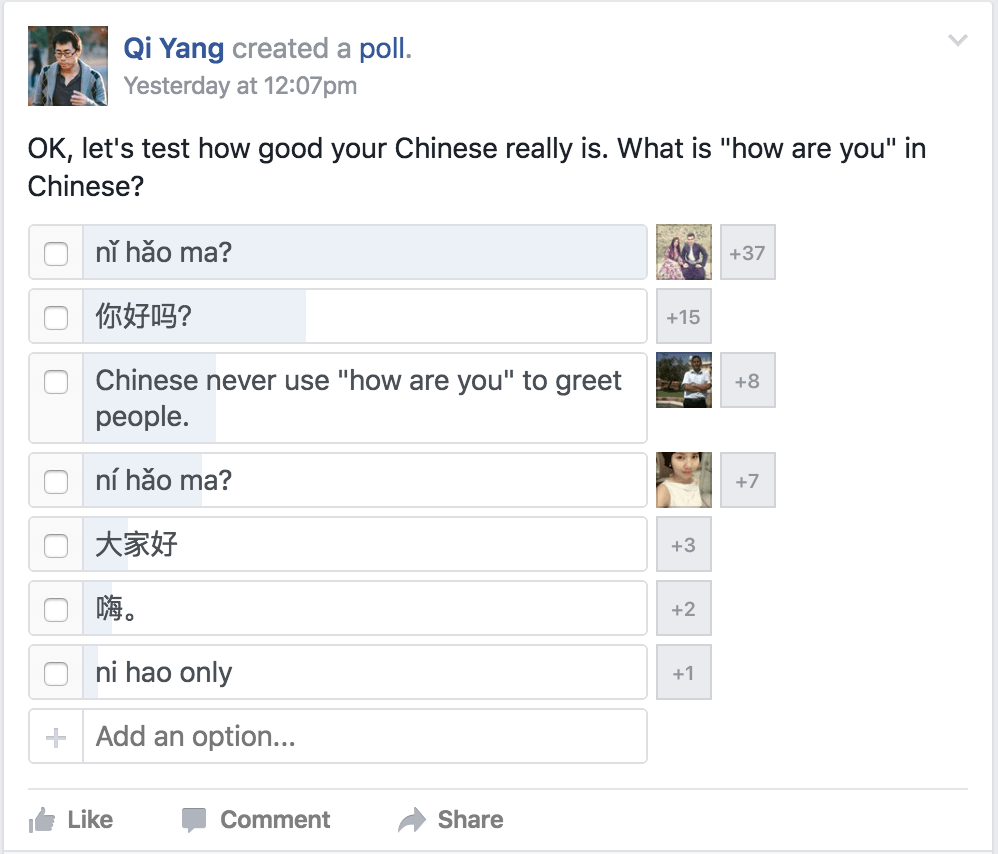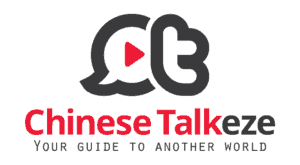ni hao ma or not ni hao ma?
It all started with a poll I created on Facebook asking people’s opinion on the popular Chinese phrase “ni hao ma”…

Originally I only gave 3 options, the other options were added by others and here are the 3 options I provided:
- nǐ hǎo ma?
- ní hǎo ma?
- Chinese never use “how are you” to greet people.
Are you ready for the cold hard truth? Chinese never use “how are you” to greet people. Boom! Did you get it right?
Let me first summarise the outcome of this poll:
- 76 people participated in the poll
- Only 11.8% of people (9 out of 76) chose the correct answer (Chinese never use “how are you” to greet people). 3 out of the 9 votes were voted by Chinese. So really there is only 8.2% of people (6 out of 73) got it right.
- 91.8% of people (67 out of 73) got it wrong
Surprise! Yes, I am serious. I was born and raised in Beijing. I’ve never heard native Chinese greet one another with “ni hao ma/你好吗” in my entire life! I’ve only heard this greeting from non-native speakers, which is backed up by the statistics.
Why was I taught “ni hao ma 你好吗” then?
Because you asked for it. “How are you” is the most common way to greet people in English, therefore it’s natural for an English speaker to ask a Chinese how to say “how are you?” Well, literally translating “how are you” into Chinese is “ni hao ma”. You get what you ask for.
But sadly, what you want is not always what you need. You were not told that this is not the way Chinese greet one another. If you’ve learnt “ni hao ma” from a Chinese language course, chances are the course is designed by an English speaker not a native Chinese.
nǐ hǎo or ní hǎo?
Another thing I’d like to point out is the pronunciation of ni hao 你好. As you can see from the poll:
- 82.6% of people voted for “nǐ hǎo ma”. (38 out of 46 people)
- 17.4% of people voted for “ní hǎo ma”. (8 out of 46 people)
If you have learnt about the Chinese tones, you would probably know that “ni 你” is a third tone character and “hao 好” is also a third tone character. Then you put these two characters together you get “nǐ hǎo”, right? Wrong. When you have two third tone characters put together the first character is pronounced in the second tone. So the correct pronunciation should be “ní hǎo”. You’ll actually find it hard to pronounce both characters in the third tone fast. Only 17.4% of people got this one right.
I know some people may get pedantic about the tone marks. Although it is pronounced as “ní hǎo”, the pinyin should still be written as “nǐ hǎo”. In my opinion, it’s more important to teach people the right pronunciation than to teach them the right pinyin marks. Because at the end of the day, what’s good about writing out perfect pinyin marks while getting the pronunciation wrong? On the other hand, I think it’s probably okay to keep the original tone marks and clearly explain to the learner why the third tone is pronounced in the second tone.
How do Chinese greet one another then?
Here are the most common ways:
nǐ zuì jìn hǎo ma? 你最近好吗?Have you been well lately?
Adding the word zuì jìn (lately) makes enough difference to make the distinction between a native speaker and a foreign speaker. Unlike “how are you” in English, this sentence is generally considered to be genuinely caring for the person being asked and not just merely saying hi to people.
nǐ zuì jìn zěn me yàng? 你最近怎么样?How are you lately?
This is one of the most popular Chinese greetings. If in doubt, just use this one.
nǐ zuì jìn máng shén me ne? 你最近忙什么呢?What are you busy with lately?
People are busy nowadays, and therefore asking what they are up to is quite common.
háo jǐu bú jiàn. 好久不见. Long time no see.
This one is straight forward enough. Just a note on the pronunciation:
- hǎo jǐu is pronounced as háo jǐu.
- bù jiàn is pronounced as bú jiàn.
chī le ma? 吃了吗?Have you eaten yet?
This is not a joke. This used to be a very popular phrase for greetings but not anymore. Especially in Beijing. People used to ask the other person if they have eaten yet to imply “come eat at my place”. If the other person replies with “yes, I have.” then you would say “eat a bit more” (in my place). Otherwise, the other person would say “no, but going to eat now.” to politely refuse the request. No one uses this phrase now because it’s just too out of date.
When talking to a friend
- Often times ní hǎo 你好 is unnecessary
- nǐ can be omitted from “nǐ zuì jìn zěn me yàng” and “nǐ zuì jìn hǎo ma”
There you have it. The Chinese ways to greet one another.

Wow…Thanks for sharing this for us. It’s extremely useful! Thanks heaps!